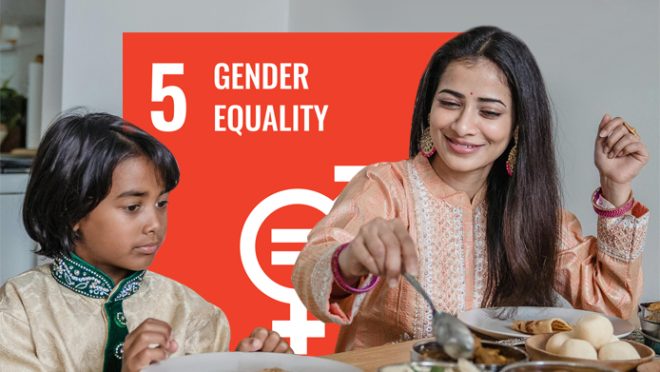Unpaid labour behind closed doors
Unpaid labour behind closed doors

Have you ever paused to think about the work that goes on behind closed doors, the quiet hum of daily life within households?
The countless hours spent cooking, cleaning, and caring for family members often fall disproportionately on the shoulders of women, leaving them with limited time for personal pursuits and professional advancement. In the heart of every Bangladeshi home, a timeless story unfolds, a story of meals cooked, chores done, and children cared for.
This is about the unaddressed struggles stitched into the very fabric of society that holds back progress toward a more equal tomorrow by keeping economic empowerment suppressed. Recognising the unacknowledged work that is done behind closed doors is the first step towards comprehending the intricate network of gender roles that exist in our families.
A recently published article in the International Journal of Social Economics (IJSE) titled “Gender-based Division of Household Labour: A Study of Selected Districts of Bangladesh” by Sabiha Afrin and Md Khaled Saifullah both from the Department of Economics, School of Business and Entrepreneurship, Independent University, Bangladesh (IUB), shed light on this widespread problem and provided insights into its underlying causes.
Evidence shows that women willingly participate in housework most of the time and hence have insufficient time for schooling, work, politics, and leisure (UN Women, 2018). Owing to the importance of domestic and care work that goes unpaid, the United Nations regards it as one of the markers of Sustainable Development Goal 5.
Housework comprises diverse forms of domestic labour like food preparation, cleaning, doing dishes, getting water, collecting firewood, and other things needed for the maintenance of the home.

Also included in this is unpaid caregiver work, which involves looking after children, the sick, and the elderly. All this falls under the term societal reproduction, and in addition, home maintenance, social management, and religious, ceremonial and social obligations are mostly devalued responsibilities (Momsen, 2020).
The published article specifically concentrates on the districts of Madaripur and Gopalganj for understanding the complexities of the gendered division of household labour and its implications for gender equality in Bangladeshi society. Based on survey data, the findings of the paper transcend mere statistical analysis by painting a vivid picture that offers glimpses into the lives of Bangladeshi women.
Demographic and socioeconomic factors of women were found to harm the total hours spent on household work, suggesting that factors such as age, marital status, number of family members, number of children, education level and employment status significantly influence women’s involvement in domestic chores.
Conversely, there was a negative relationship between women and social perception, highlighting the impact of societal norms and expectations on women’s domestic responsibilities.
However, even in this, there was an element of hope amidst such challenges. The research presents a positive relationship between women and empowerment, indicating that women who view themselves as empowered spend fewer hours engaged in household work. Breaking free from the grip of traditional gender stereotypes and promoting economic empowerment is possible through education and by empowering women with skills and resources.
These findings have significant implications for legislative policy in reducing gender-based inequality in Bangladesh. The paper suggests that education on equality regarding household labour should be part of the curriculum, efforts that facilitate skill development in women should be initiated by the government and private sectors, unpaid household labour of women should be counted as their contribution toward sustainable development, and gender-biased stereotyping should be changed in the communities through community-based awareness.
So, where do we go from here? How do we translate these findings into meaningful action? The answer is found in our common dedication to questioning gender expectations, encouraging a shared sense of accountability, and enabling women to stand up for their rights both within and outside the house. As Bangladesh marches toward a future marked by inclusivity and equality, it’s crucial to take heed of the lessons from this study and take tangible steps toward dismantling age-old gender stereotypes. By fostering a sense of shared responsibility within our households, we can pave the path toward a fairer society where everyone, regardless of gender, can flourish.
Khadiza Akter Tasnim and is an undergraduate student Dr Md Khaled Saifullah is an assistant professor at the Department of Economics, School of Business and Entrepreneurship of Independent University, Bangladesh.


